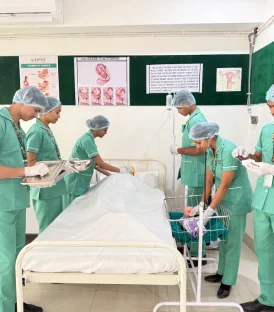September 16, 2017
The field of radiology incorporates a wide range of digital imaging technologies and provides many different career opportunities – Aruna Singh
Have you ever notice those guys in hospital gowns who escort patients for an X-Ray CT-Scan or Chemotherapy? They are the one who operates the machine for you and later interprets the results for doctors. The word used for them are Radiographers. Radiographers, also known as radiologic technologists, are certified technicians who capture images of organs, bone, and tissue for patient diagnosis. Radiographers are equipped with the technological skills to handle imaging equipment and the interpersonal skills necessary for patient care. Educational and licensure requirements vary by state and profession, through completion of a certificate or 2-year degree program is common for radiologic technologists. Now India’s healthcare sector on a growth trajectory, the career opportunities for such allied healthcare workers with expertise in diagnostic science have never been better. Services of diagnostic professionals can be essential for medical treatments and their demand is on the rise.
Nature of Work
Radiologic technologists perform medical imaging exams and administer radiation therapy treatments. With the help of various imaging technologies, these professionals take pictures of a patient’s body for radiologists, who will then interpret the images. Radiologic technologists often specialize in a particular examination technique, such as mammography or bone densitometry. These professionals can also assist oncology teams in delivering radiation therapy to cancer patients. Radiology technicians work in hospitals, clinics, imaging centers, private physician offices or even mobile imaging service centers. While hospitals remain the leading job providers, they also tend to be much busier than outpatient settings. A radiology technician typically works a standard 40-hour week, but some positions require on-call night or weekend work.
Career opportunity
DPMI Principal Dr. Aruna Singh says, a career in radiologic technology can lead in many directions. Radiologic technologists are needed in every healthcare setting. You could work in a large hospital, a suburban outpatient clinic or a rural physician’s office. You could specialize in dozens of clinical areas ranging from prenatal care to orthopedics. You could manage an entire radiology department, including its budget and personnel. You could teach, inspiring new generations of radiologic technologists, or you could perform research that leads to breakthroughs in diagnostic imaging or radiation therapy. With additional education, you could become a radiologist assistant, expanding your capabilities by serving as a radiologist extender. The boundaries of your career in radiologic technology are determined only by your own abilities and interests.
Necessary Skills and Qualities
Good communication skills, a focus on detail, and careful attention to the procedure are essential to success as a radiology technician. Physical strength is needed to position patients, and at times, to lift them onto examination tables. As with healthcare professionals in general, empathy, cultural sensitivity, and high ethical standards are necessary as well.
Course and Eligibility
The curriculum for radiologic technology and related programs includes coursework as well as a series of supervised clinical exercises where students learn how to position patients and perform procedures. A background check, immunizations, and a physical examination may be required prior to entering these programs. Applicants can pursue Certificate courses, diploma courses, as well as bachelor’s course in the field of radiology. Duration of the Diploma course is 1 year and 2 years, eligibility is 10+2 preferably with Physics, Chemistry and Biology/Math or equivalent in any stream from a recognized board or university.
Remuneration
A career in radiography can be very promising. In India, the average starting salary of a radiographer ranges between Rs.7, 000 – Rs.10, 000 per month in government/private hospitals. However, earnings are more in private practice as compared to salaried jobs. A large aging population in need of imaging to diagnose and treat medical conditions should keep demand strong for radiologic technologists. The Bureau of Labor Statistics predicts employment growth of about 9 percent between 2014 and 2024 for this profession, and 17,200 new positions will need to be filled.
Opportunities are also there in Gulf countries and the Middle East countries. In these countries, radiographers get salaries between Rs.30, 000 – Rs.50, 000 per month. In the UK, the average starting salary of a newly qualified Radiographer is around £17,000 per year which is much more than what it is in India. You can study at Delhi based Delhi Paramedical and Management Institute for the certificate and diploma course in radio imaging technology.
ADMISSION FOR ACADEMIC SESSION 2017-18 IS OPEN..
FOR MORE DETAILS,
MOBILE : +91-9540777001/2, 7290005127, 7290005128, 7290005129, 7290005130
E-mail : admissions@dpmiindia.com, info@dpmiindia.com
visit our website: www.dpmiindia.com
————————————————————————————–
FOR FRANCHISEE OPPORTUNITY WITH DPMI:
Phone : +91 9540777006, +91 8743943535, +91 7290005144
E-mail : hodfranchiseedpmi@gmail.com

















